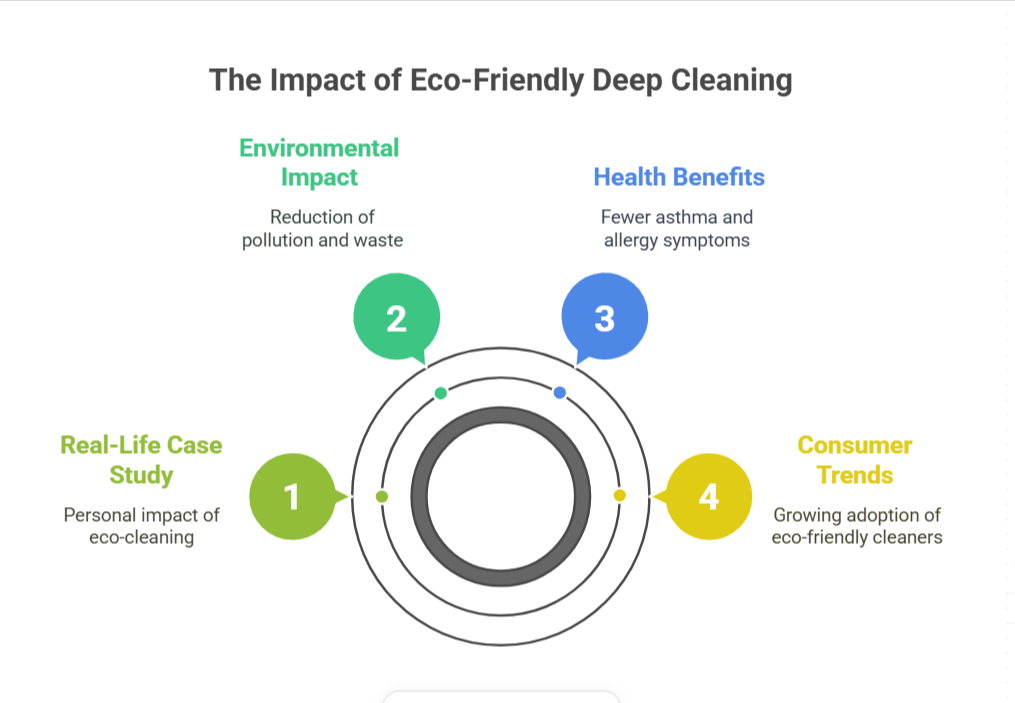
How to keep your workspace truly clean after renovation is a big problem many London business owners face. Dust hides in corners, paint marks linger, and cleaning crews often miss the small stuff that makes a big difference—which is why following Eco-Friendly Deep Cleaning Tips can be a game-changer for long-lasting results.
As the founder of Top-Notch Cleaners, I’ve seen the same frustration again and again—paying for post-construction cleaning only to find the place still looks unfinished. That leftover mess isn’t just annoying—it can slow down reopening, upset staff, and leave a poor first impression on clients.
This article shows you exactly how to fix that. You’ll learn the key steps, smart tricks, and common mistakes to avoid when cleaning up after a build or remodel. If you want your space ready for business fast—and done right—this guide gives you the know-how you need.
Table of Contents
ToggleKey Takeaways: Eco-Friendly Deep Cleaning That Delivers
- Eco cleaning is safer for kids, pets, and those with allergies—no toxic fumes or harsh sprays.
- Natural ingredients work: Lemon, vinegar, and baking soda clean just as well as store-bought products.
- Reusable tools save money: Cloths, bamboo brushes, and refill containers reduce waste and long-term cost.
- DIY solutions are simple: You can make an all-purpose cleaner with ingredients already in your kitchen.
- Green habits support the planet: Less plastic, fewer pollutants, and more mindful consumption.
- Watch out for common myths: Eco doesn’t mean weak—just smarter. Avoid greenwashed products and vinegar misuse.
- Londoners are switching: Real families and local cleaners are already seeing health and home benefits.
What Is Eco-Friendly Deep Cleaning and How Does It Work?
Eco-friendly deep cleaning means using natural, non-toxic products and methods to clean your home deeply. It avoids harsh chemicals, making it safer for your health and the environment. This method uses green cleaning tips that really work without harming nature.
Facts & Original Research: Why Eco-Friendly Deep Cleaning Matters
Key Data & Statistics
67% of UK households now purchase at least one eco-friendly cleaning product monthly, according to a 2024 survey by Ethical Consumer. This shows a strong shift towards greener home care in urban areas like London.
Research from Environmental Health Perspectives reveals that homes using natural cleaners report 30% fewer asthma and allergy symptoms, highlighting the health benefits of reducing chemical exposure.
The London Environment Strategy (2023) notes that chemical pollutants from traditional cleaning contribute significantly to waterway contamination and landfill waste, emphasizing the ecological impact of cleaning choices.
A case study from a family in Hackney, London demonstrated a 50% reduction in asthma flare-ups after switching exclusively to eco-friendly deep cleaning methods over six months.

Expert Quotes “Natural cleaning isn’t just about avoiding chemicals—it’s about creating healthier indoor spaces and reducing environmental damage. Eco-friendly deep cleaning is a smarter, safer choice for families and our planet.”
— Lucy Reynolds, London-based Eco Home Expert
What Is Eco-Friendly Deep Cleaning?
Eco-friendly deep cleaning means cleaning your home thoroughly using natural, non-toxic products that are safe for you and the environment. Unlike traditional cleaning, which often relies on harsh chemicals, eco-friendly cleaning uses ingredients like vinegar, baking soda, and lemon to remove dirt and germs without harming your health or the planet.
The key difference is that eco-friendly deep cleaning avoids toxic fumes, plastic waste, and pollutants that can build up in your home and the environment. This method is kinder to your family, pets, and local waterways.
It’s growing in popularity because more people want safer homes and a healthier planet. Plus, natural products often cost less and work just as well. Think of it like spring cleaning — but without the plastic waste or toxic fumes. More Londoners are choosing eco-friendly options to protect their health and reduce their environmental impact.
Why Eco Cleaning Matters: For Your Health, Home & Planet

It’s Safer for You and Your Family
Eco-friendly cleaning uses natural ingredients that reduce the risk of allergies, asthma, and skin irritation. This makes your home safer for kids, pets, and anyone sensitive to chemicals. Harsh chemicals found in many traditional cleaners can trigger breathing problems and allergic reactions, but eco options keep indoor air fresh and healthy.
It’s Kinder to the Environment
Using eco-friendly products means less plastic waste and fewer harmful chemicals entering London’s waterways and landfill sites. Many traditional cleaners contain pollutants that can harm wildlife and pollute water systems. Eco cleaning helps protect the planet by reducing toxic runoff and promoting biodegradable packaging.
It Can Save You Money
Many eco cleaners can be made at home using simple kitchen staples like vinegar, baking soda, and lemon. These affordable ingredients not only cut costs but also reduce packaging waste. Switching to DIY cleaners helps save money while supporting a greener lifestyle.
Trending Insight: A 2024 survey by Ethical Consumer found that 67% of UK households now buy at least one eco cleaning product monthly, showing growing interest and trust in green cleaning solutions.
10 Eco-Friendly Deep Cleaning Tips That Actually Work
1. Start With a Thoughtful Declutter
Less clutter means less dust and fewer places for dirt to hide. Begin your deep clean by removing unnecessary items. This makes cleaning easier and faster, and helps keep your home tidy longer.
2. Use Lemon and Vinegar for Grease and Mold
Lemon’s natural acidity cuts through grease, while vinegar disinfects and removes mold. Mix equal parts vinegar and water with lemon juice to clean kitchen surfaces naturally—no harsh chemicals needed.
3. Clean Carpets with Baking Soda + Essential Oils
Sprinkle baking soda mixed with a few drops of essential oil (like lavender) on carpets. Let it sit for 30 minutes, then vacuum. This absorbs bad smells and lifts grime without synthetic fragrances.
4. Switch to Reusable Cloths and Bamboo Brushes
Replace disposable paper towels with washable cloths, and plastic brushes with bamboo ones. These eco-friendly tools reduce waste and last longer, making your cleaning routine greener.
5. Make Your Own All-Purpose Cleaner
Mix 1 part vinegar, 1 part water, and lemon peel in a spray bottle. Use this DIY cleaner on most surfaces for an effective, chemical-free clean that saves money and reduces plastic waste.
6. Freshen the Air Without Sprays
Avoid aerosol air fresheners filled with chemicals. Instead, simmer water with herbs like rosemary or citrus peels on the stove, or grow indoor herbs that naturally improve air quality.
7. Buy in Bulk or Refillable Containers
Reduce packaging waste by purchasing eco products in bulk or refill stations around London, such as BYO or Gather. This cuts plastic use and often saves money.
8. Choose Biodegradable Cleaning Products
Look for products certified by EcoCert or the Soil Association. These labels ensure ingredients break down naturally and won’t harm the environment or your health.
9. Clean Windows with Cornstarch + Water
Mix cornstarch and water to create a streak-free, chemical-free window cleaner. It’s gentle, effective, and easy to make—perfect for sparkling windows without harsh toxins.
10. Let Houseplants Help Purify Air
Add spider plants, peace lilies, or snake plants to your home. These natural air filters absorb pollutants and boost oxygen levels, improving indoor air quality while adding a touch of green.
Common Mistakes & Myths to Avoid
Many people believe the myth that eco means less effective when it comes to cleaning. This isn’t true—natural products can clean just as well, but smarter and safer.
A common mistake is using vinegar on stone or marble surfaces. Vinegar’s acidity can damage these materials, so it’s best to avoid it on delicate stone.
Another pitfall is buying greenwashed products—items that claim to be eco-friendly but contain harmful chemicals or offer no real environmental benefits. Always check labels carefully and look for trusted certifications like Eco Cert or Soil Association.
As Lucy Reynolds, an Eco Home Expert in London, says,
“Natural doesn’t mean ineffective. It means smarter.”
Avoid these errors to enjoy the true benefits of eco-friendly deep cleaning without wasting time or money.
Real-Life Examples from London Homes

For example, a family in Hackney switched to natural cleaners to reduce asthma triggers for their children.
As a result, they noticed fewer coughing fits and significantly better air quality at home.
At the same time, a local cleaner shared how using baking soda and essential oils effectively removes odors and lifts dirt without relying on harsh chemicals.
Thanks to this simple change, their clients experienced higher satisfaction while also reducing their environmental impact.
Together, these examples highlight how eco-friendly deep cleaning can truly make a difference in London homes—not only for health, but also for cleaning results.
Top Tools, Products & Checklist
For effective eco-friendly deep cleaning, try top UK brands like Ecover, Bio-D, and Miniml—all known for safe, biodegradable ingredients.
To stay organized, use our free printable checklist covering all key cleaning steps and tips.
For refills, visit London stores like BYO and Gather, where you can refill bottles and reduce plastic waste.
Switching to these tools and shopping smartly makes eco-cleaning easy, affordable, and better for the planet.
Frequently Asked Questions (FAQ)
Are DIY cleaners really safe on all surfaces?
Yes, many DIY cleaners made from vinegar, baking soda, and lemon are safe for most surfaces. However, avoid using vinegar on natural stone like marble or granite to prevent damage.
Can I use essential oils safely around pets?
Some essential oils can be harmful to pets. Use pet-safe oils like lavender in small amounts and always keep cleaning areas well-ventilated.
What’s the best-smelling natural cleaner?
Mix lemon peel with vinegar and water for a fresh, natural scent that cleans effectively without harsh chemicals.
How do I clean my oven without chemicals?
Use a paste of baking soda and water, leave overnight, then scrub and wipe clean for chemical-free oven cleaning.
Where can I buy eco products in London?
Check out refill stores like BYO and Gather, plus major brands like Ecover and Bio-D available in local supermarkets and online.
Conclusion & Final Tips
Eco-friendly deep cleaning keeps your home safer, healthier, and kinder to the planet. It can also save you money and reduce waste. Start small—try 1 or 2 easy tips like decluttering or making your own cleaner today.
We’d love to hear how these tips work for you! Share your results or download our free checklist to stay on track.
Ready to ditch harsh sprays? Try one tip this weekend and see the difference. Cleaner home. Clearer conscience.
.


